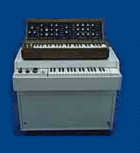







































|
Bubu - Anabelas
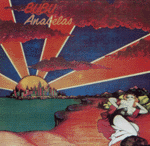
Click on the album cover to hear a sample
Comments:
Bubu's Anabelas is one of the top prog albums to
come out of Argentina in the 1970s. Released in 1978, this album consists of three long compositions, and features mostly instrumental music that sounds like
a combination of early King Crimson and Änglagård. Bubu was quite a large
band. Along with the traditional rock set-up(guitar, bass, and drums), the band featured a violinist, flutist,
saxophonist, and pianist. Each composition is filled with intense interaction between the musicians, dozens of melodic surprises, and unexpected tempo changes. My only complaint here is with the weak vocal sections on the last two tracks, although, the vocal sections are kept short. If you're looking for an introduction to the Argentinian prog scene, or if you're a fan of Änglagård, this is an album to add to your collection.
Year: 1978
Compositions: 10/10
Vocals(in Spanish): 7/10
Recording Quality: 9/10
Crucis - Kronologia
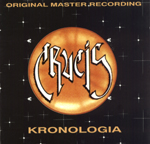
Click on the album cover to hear a sample
Comments:
The Kronologia CD includes the only two albums released by Crucis. Crucis were well-known during the mid-70s, and their debut album Crucis proves why. The seven compositions on the original album are short in length, but emphasize fast tempos, tons of changes, and jaw-dropping interplay between the musicians. Despite their short length, the tracks end-up sounding like longer epics. Spanish vocals appear on a couple of tracks and they are similar in style to the classic Italian prog bands of the time. Los Delirios Del Mariscal, on the other hand, seems a bit less inspired. The energy level is lowered a bit, and the tracks emphasize long guitar solos, moody atmospheres, and more vocals. Overall, though, Kronologia is a great deal, and you will definitely get your money's worth with Crucis. Just think of Los Delirios Del Mariscal as a bonus album.
Year: 1976/1977
Compositions: 9/10
Vocals(in Spanish): 8/10
Recording Quality: 9/10
Webpage:
The Unofficial Crucis
Webpage
Espiritu - Crisalida
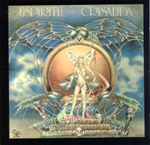
Click on the album cover to hear a RealAudio
sample.
Comments:
Espiritu's Crisalida is an above-average album influenced by Yes, early Genesis, and some of
the early Italian prog bands. The band focuses on creating mellow interaction between the analog keyboards, electric and acoustic guitar, and vocals. Although nothing gets as complex as other symphonic prog bands like Crucis, Cathedral, or Shylock, the music here is far from simple. Themes are introduced, developed, and then appear from time to time as the album unfolds. A concept album, I'm almost sure? Unfortunately, I can't tell from listening to the lyrics. Recently, someone told me that Crisalida was released around 1973(the CD label has no info). This fact blew me away, because I would have placed the album as a 1979/1980 release. The music here was several years ahead of its time.
Year: 1973
Compositions: 7/10
Vocals(in Spanish): 7/10
Recording Quality: 8/10
Pablo "El Enterrador" - Pablo "El Enterrador"

Click on the album cover to hear a RealAudio
sample.
Comments:
I wouldn't go as far as to say that this is a "masterpiece" from Argentina,
which I have heard often, but the majority of the tracks on Pablo "El Enterrador" are of the highest
quality. This band's music emphasizes rapid, and colorfully melodic, interaction between two keyboardists and a guitarist. The band's melodic and rhythmic style is very "Latin American" in nature and sets the album apart from the band's European prog influences. Many collectors tend to compare Pablo "El Enterrador" to Locanda Delle Fate. Well, they might have a point due to the dual keyboard interaction, but the music here is very different from Forse Le Lucciole Non Si Amano Piu. I also tend to hear a strong Tony Banks influence in the keyboard melodies. Overall, Locanda Delle Fate and early Genesis are two good comparisons, but the music here rarely reaches that level of quality. Plus, the band decided to include 2 rather cheesy latin-pop tracks on each side of the LP. The sound-quality of the CD, though, is really what keeps me from enjoying this album. It's discouraging to have to focus to hear the multiple layers of melodies, intricate rhythms, and even some of the added percussion instruments(there are actually congas deep in the mix!). I don't really know what happened to this album when it was reissued on CD. Apparently, the LP sounds killer, but when the sound-engineer transfered the LP to CD the job was definitely sloppy(cheap software, or maybe the SE had a terrible ear for sound at the time). Hopefully, in the future, a label will come in and properly clean the sound up. Expect a classic of South American progressive rock, but put it on hold until someone remasters it properly.
Year: 1980 (some websites list it as a 1983 release)
Compositions: 7/10
Vocals(in Spanish): 8/10
Recording Quality: 6/10
El Reloj - II
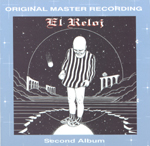
Click on the album cover to hear a RealAudio
sample.
Comments:
After hearing II for the first time, I figured El Reloj were nothing more than a Deep Purple clone. At least, that was my impression after
hearing the first two tracks which, strangely, serve as the bonus tracks of the CD. After
listening to the rest of album, though, I was more than impressed. The tracks following the bonus track are quite original and feature fast twin-guitar interplay and multiple sections in various tempos. The band's influences probably included Black Sabbath, and Led Zeppelin, yet they took those two influences and kicked the prog up a notch. My only complaint with this album is that the singer tends to sing in a heavy-metal style and even imitates Robert
Plant in Spanish. Fortunately for the ears, the vocal sections are kept at a minimum. Overall, this is a great CD for early-metal, and heavy prog fans.
Year: 1976
Compositions: 10/10
Vocals(in Spanish): 6/10
Recording Quality: 9/10
|
